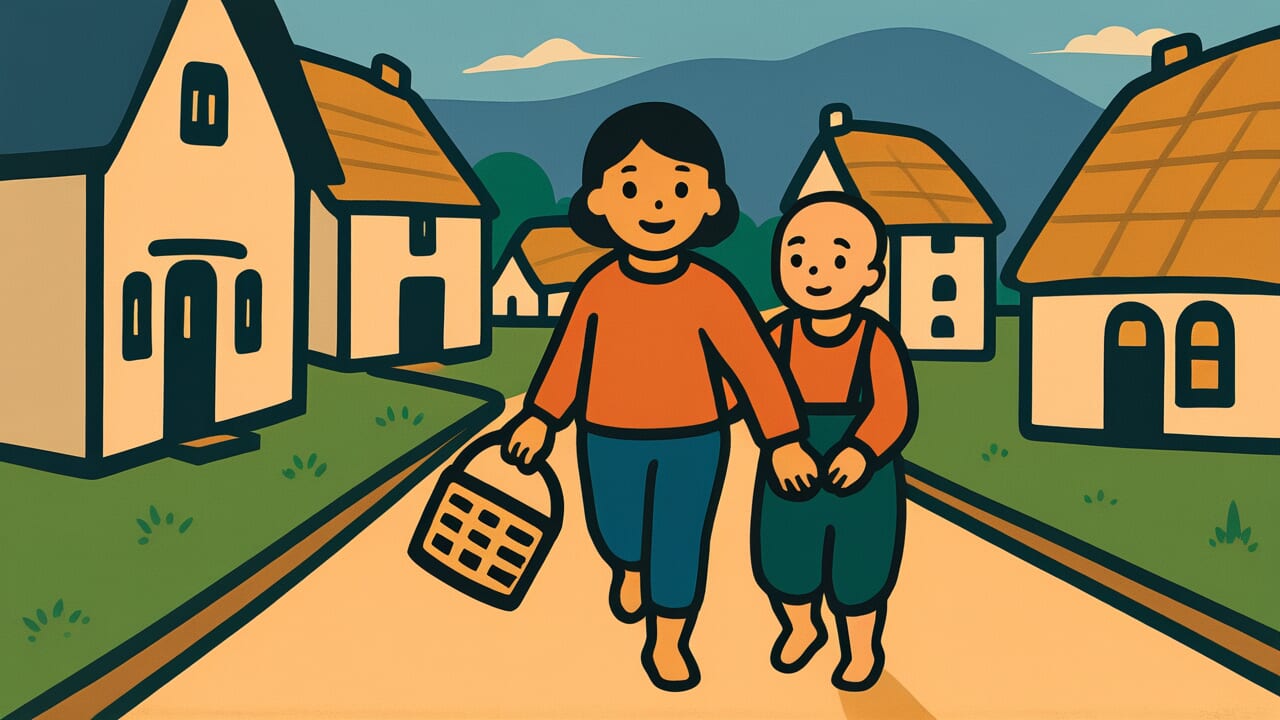How to Read “Even an abandoned child is raised by the village”
Sutego mo mura no hagokumi
Meaning of “Even an abandoned child is raised by the village”
This proverb teaches that even children without blood ties should be raised with care and responsibility by the entire community.
The term “abandoned child” sounds harsh. But here it refers to children without parents, or children whose birth parents cannot raise them for some reason.
Such children should also be warmly nurtured as members of the village community. Like parent birds wrapping their chicks under their wings, the community should embrace them.
This proverb is used when people confirm their shared responsibility for raising children. It shows an attitude of treating childcare as a community issue, not just an individual or single family problem.
Today, nuclear families are common and community ties have weakened. Yet the idea that “society as a whole raises children” remains deeply important.
This saying embodies a universal spirit of human love. It tells us that blood ties are not the only condition for family and bonds.
Origin and Etymology
The exact first written appearance of this proverb is not identified. However, the structure of the words reveals an interesting background.
The word “hagokumi” is old Japanese that is rarely heard today. Written as “羽含み” (wing-embrace), it describes parent birds wrapping chicks inside their wings to warm and carefully raise them.
This word carries the meaning of warm protection and nurturing that transcends blood ties.
In Japanese village society before the Edo period, not just individuals or families but entire villages functioned as communities that raised children.
It was not unusual for villagers to cooperate in raising children who lost parents or could not be raised due to unavoidable circumstances.
This proverb is thought to have been born in an era when such mutual aid spirit remained strong.
Even facing the harsh reality of “abandoned children,” it teaches the responsibility and love that a village community should have.
Like parent birds wrapping chicks with their wings, the entire village warmly embraces children. This ideal form of community is condensed in these few words.
Usage Examples
- When discussing foster care systems, my grandmother said “Even an abandoned child is raised by the village” and taught me the importance of community support
- I encouraged a friend hesitating about adoption by saying, “Haven’t people always said ‘Even an abandoned child is raised by the village’?”
Universal Wisdom
Behind this proverb’s transmission through generations lies an essential truth about human society.
Children are not possessions of individuals or single families. They are treasures who carry the future of the entire society.
Blood ties as biological connections are certainly powerful. But what makes humans vastly different from other animals is our ability to care for others beyond blood relations and help each other as communities.
This ability may be the greatest weapon that has brought prosperity to humanity.
Children who lost parents or face circumstances preventing their care have existed in every era. Do we abandon such children, or does society embrace them as a whole?
This choice becomes a measure of that society’s maturity.
This proverb contains deep insight that protecting the vulnerable ultimately strengthens the entire society.
Children helped today become the strength supporting tomorrow’s society.
Most importantly, children who grow up seeing others being helped will help others in the next generation. This chain of goodwill is the universal wisdom that has made human society sustainable.
When AI Hears This
Raising children without blood ties appears completely disadvantageous from a genetic perspective. You cannot pass on your genes, yet you use precious food and time.
But humanity has continued this seemingly irrational behavior for thousands of years.
Here lies an interesting discovery from evolutionary biology. In computer simulations competing various groups, populations with “genes that help troubled people” have higher long-term survival rates than populations with “genes that benefit only themselves.”
In other words, what is disadvantageous at the individual level becomes advantageous at the group level.
Villages that raise abandoned children secure the next generation even when adults die in famines or disasters. Labor force also increases.
Calculated coldly, child-rearing costs about 15 years, but afterward they contribute to the group for over 50 years.
More importantly, this cooperative behavior is remembered as “reputation.” In villages where people help abandoned children, the expected value of receiving help when you face trouble increases.
This is called reciprocal altruism.
Even without blood ties, groups with strong cooperation networks are more resistant to environmental changes. This proverb expressed the mechanism by which genes optimize at the group level rather than individual level, without using scientific terms.
Lessons for Today
This proverb teaches modern people that we must not confine childcare to “individual responsibility” alone.
In today’s society, many parents carry everything alone and suffer in isolation. But originally, raising children should be an endeavor where many people get involved and support each other.
What you can do need not be grand. Speak to neighborhood children, extend a hand to struggling parents, spend a little time on community childcare support.
Such small accumulated involvements become warm wings that embrace children.
Also, this proverb affirms family forms beyond blood ties. Adoption, foster care, stepfamilies.
Though forms differ, the value of raising children with love remains unchanged.
What matters is the awareness that we should create an environment where all children grow up safely, as an entire society.
When each person gets involved a little, we can realize a warm society where no one is isolated.
This proverb shows us such hope.



Comments